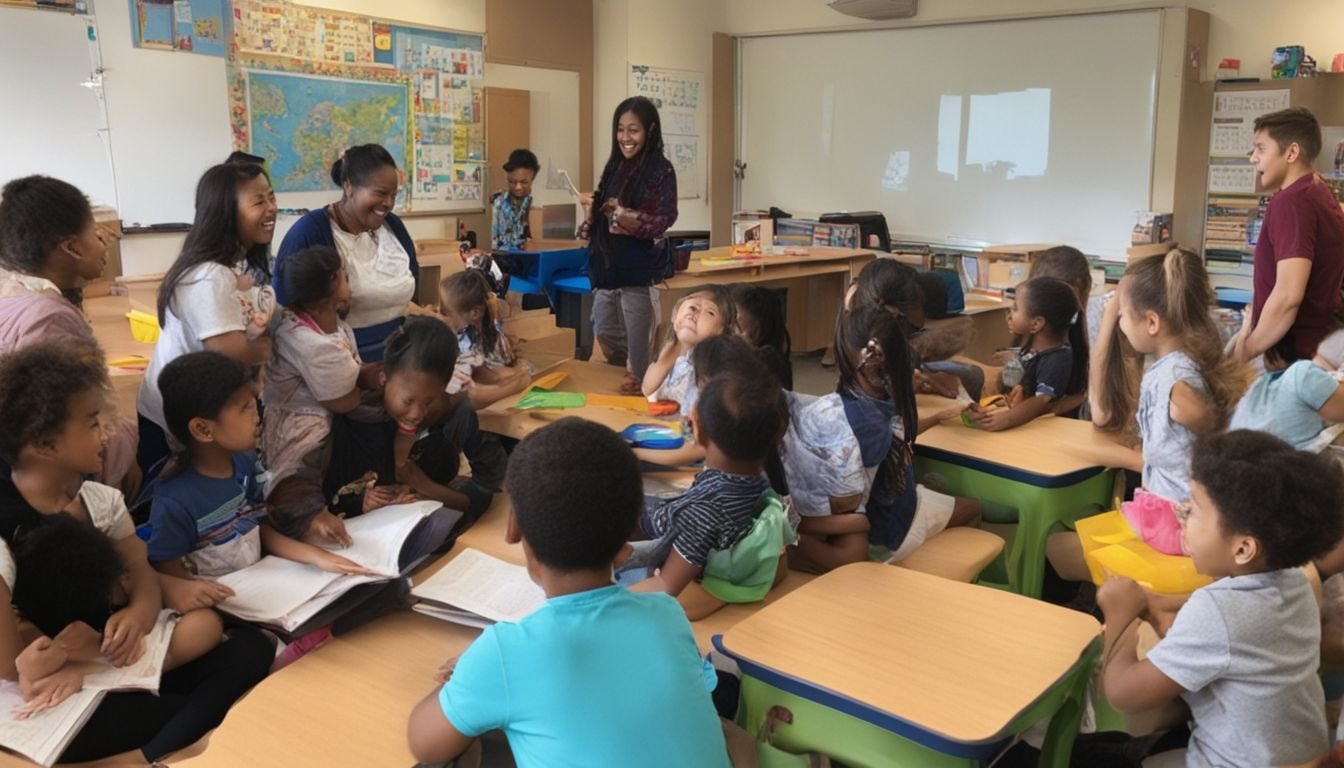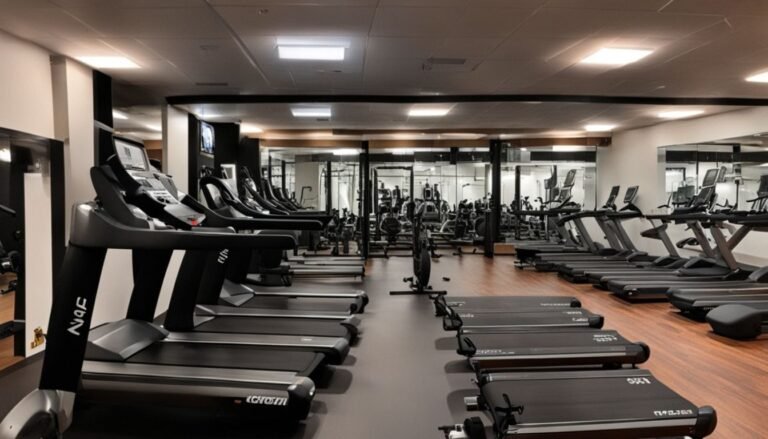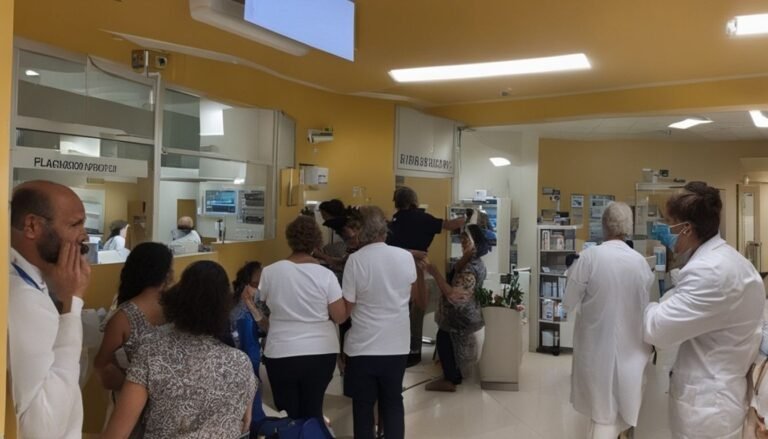Educational Facilities: Schools and Language Centers
Choosing the right educational facility can be tough. ELS has been helping students with English since 1961. This article will guide you through key services and programs at schools and language centers, ensuring you find what best suits your needs.
Keep reading to discover more.
Overview of Language Centers

Language centers offer classes to help people learn new languages. They have programs for students of all ages, including kids starting school and adults looking to improve their skills.
ELS Language Centers
ELS Language Centers have taught English since 1961. They have helped over 1.2 million students from 143 countries learn English. Their certifications, levels 109 or 112, are key for students who need to meet language entry requirements at more than 600 colleges.
ELS won the ST Star Chain School Award three times—in 2019, once again in 2022, and they shared this honor with ILSC Education Group in 2023.
Students must be between ages of 16 to18 to join, depending on the center’s location. You can find these centers in cities across the United States including Chicago, Illinois; Cincinnati; Cleveland; Houston; Los Angeles County; Melbourne; Nashville; New York City; Philadelphia; San Francisco North Bay; St.
Paul, and St. Petersburg. These centers use modern methods like online classes and incorporate advancements in educational technology into their teaching practices.
Charter and Special Education Services
In Florida, 30% of charter schools offer programs for students with special needs. These schools follow a law that lets them create spaces just for special education. This means kids who learn differently have more choices.
They can find places where teachers know how to help them best. With the right support, these students can do well in school and feel part of their community.
These charter schools use different teaching methods to meet each student’s needs. They have small classes so each child gets more attention. Teachers also use technology and new ways to make lessons interesting and easier to understand.
For families looking for good education options for their children with learning difficulties, these charter schools are a great choice.
Innovative Educational Approaches
Schools now use new ways to teach better and help students learn more. They try different methods like using tech in classes and special programs for kids who need extra help with language or reading.
Structured Literacy Initiatives
Structured Literacy Initiatives focus on teaching essential literacy skills in a clear and ordered way. These programs pay close attention to phonemic awareness, phonics, fluency, vocabulary, and comprehension.
They use methods that involve step-by-step teaching, lots of practice, straight feedback, and regular tests to see how students are doing. Teachers use these strategies starting from elementary school to help all students learn how to read well.
These initiatives are especially important for reading success in grades 4 through 9. They make sure every student gets the kind of learning they need right from the start (Tier 1 instruction) in general education classrooms.
This approach has proven effective for helping those who find reading challenging. By focusing on a science-based way of teaching reading (the science of reading), these literacy programs can boost language learning in schools across different grade levels.
Specialized Programs for Language and Learning Disabilities
Specialized programs focus on students with language and learning disabilities by using structured literacy initiatives. These approaches involve explicit, systematic teaching methods that build on reading and writing skills.
For example, teachers might use multisensory techniques to help students understand the relationship between letters and sounds. Schools often pair these literacy efforts with technology tools like text-to-speech software to aid learning.
This ensures all students, especially those who struggle, have access to the curriculum.
Only a small percent of people in low and middle-income countries (LMICs) get the assistive technology they need. To change this, educational centers are working hard to offer more online courses and distance learning options for foreign languages.
They aim to improve both how students can reach these resources (“access to learning”) and how they use them effectively (“learning to access”). Next up, we’ll explore support services that further enhance student success.
Support Services for Enhanced Learning
Support services boost learning by giving extra help. They include help from teachers outside class and language healing.
Tutoring and Speech Therapy
Tutoring and speech therapy services at the Stern Center for Language and Learning focus on one-on-one support. They provided over 17,374 student service hours last year, showing their wide reach and impact.
- The center offers tailor-made tutoring sessions that cater to each student’s unique needs. This personalized approach helps in building skills across various subjects.
- Speech therapy sessions work to improve students’ abilities to communicate effectively. They also help students understand social cues better.
- These services have led to notable improvements in academic performance, as reported by parents. Many have seen their children become more confident learners after attending these programs.
- Tutoring covers a range of subjects, ensuring students can find help with almost any area where they might struggle.
- For speech therapy, the center employs certified speech-language pathologists who use research-backed methods to enhance communication skills.
- Both services aim to create a student-centered learning environment that encourages active participation and engagement from the students.
- By integrating technology in their teaching methods, tutors and therapists keep sessions interesting and effective for digital-age learners.
- The minimum age requirement ensures that young learners receive early intervention, which is crucial for tackling language and learning challenges efficiently.
- Professional development for educators involved in tutoring and speech therapy guarantees that they stay up to date with the latest educational strategies and tools.
These efforts together make sure every child gets the support they need to succeed academically and socially.
Professional Development for Educators
Teachers need good training programs. These programs help them teach better and help students learn more. Here are ways to make teacher training great:
- Programs must last long enough to make a difference. Short workshops don’t work as well as longer courses.
- Experts should lead the training. Teachers learn best from people who know a lot about teaching.
- The training should include chances for teachers to work together. They can share ideas and solve problems as a team.
- Training needs to look at what teachers think and do in the classroom. This helps make sure they can use what they learn with their students.
- It’s key to mix students’ home languages and cultures into the training. This way, all students feel included and can do better at school.
- Courses on teaching English to speakers of other languages (ESL) are important, especially since 10% of public school students in the U.S. need these skills.
- Teachers should also learn how to use technology in class. This makes lessons more interesting and helps all kinds of students learn better.
- Learning how to teach kids with language or learning disabilities is another must-have skill for teachers today.
- Professional development programs should cover new teaching methods, like how to teach reading using structured literacy approaches.
These steps ensure teachers are ready to meet their students’ needs, making classrooms more effective and supportive places for learning.
Conclusion
Schools and Language Centers shape bright futures. They offer many programs, from English language courses to after-school support. Here, students get tools like tutoring and technology in learning.
Educators grow through professional development too. Everyone finds a path to success in these places.
For more resources on advanced educational services and programs, visit our comprehensive guide here.
References
- https://www.facebook.com/els/
- https://www.els.edu/
- https://www.govinfo.gov/content/pkg/ERIC-ED464427/pdf/ERIC-ED464427.pdf
- https://ncspe.tc.columbia.edu/working-papers/files/WP242.pdf
- https://education.ky.gov/curriculum/EarlyLiteracy/Pages/structured_literacy.aspx (2024-03-12)
- https://files.eric.ed.gov/fulltext/EJ1286919.pdf
- https://www.tandfonline.com/doi/full/10.1080/00131911.2022.2035685
- https://www.ncbi.nlm.nih.gov/pmc/articles/PMC6851403/
- https://sterncenter.org/
- https://www.ncbi.nlm.nih.gov/pmc/articles/PMC6466713/
- https://journals.sagepub.com/doi/10.1177/2332858419828691
- https://osse.dc.gov/page/professional-development-educators







